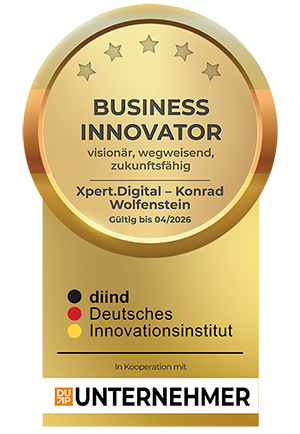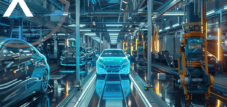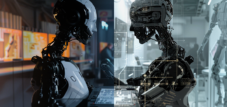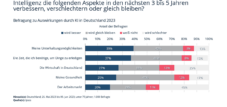Artificial intelligence: There is no such thing as THE AI agency, consulting firm or AI expert. How do you recognize someone with real AI expertise?
Published on: August 19, 2024 / Update from: August 19, 2024 - Author: Konrad Wolfenstein

THE AI expert does not exist. How do you recognize someone with real AI expertise? – Image: Xpert.Digital
🤖 Artificial intelligence as the key to the future: Overarching discipline and infrastructure factor
💡 AI: More than a discipline - The infrastructure factor of the modern economy
Artificial intelligence (AI) is not an isolated discipline like marketing, supply chain management or civil engineering. Rather, AI functions as an overarching discipline and essential infrastructure factor that is deeply integrated into various industries and segments. This penetration is changing traditional structures and opening up new possibilities in a variety of areas.
The transformative power of artificial intelligence is demonstrated by its ability to optimize existing processes, create new business models and thus significantly increase the efficiency and innovative ability of companies. Integrating AI as a foundational technological infrastructure is changing the way organizations traditionally operate while requiring an adjustment to corporate strategies.
💼 The role of AI in the economy
AI plays a diverse role in business. It helps companies save time and resources by automating routine tasks. Would you like an example? In the financial industry, AI helps analyze massive amounts of data to gain deeper insights into markets and trends. This enables more precise risk analysis and better decision making. In the area of customer experience, voice and chatbots also optimize interaction with customers by offering 24/7 support and efficiently processing recurring requests.
🏥 Transformation in the healthcare industry
The healthcare industry is another significant area where AI as infrastructure plays a crucial role. Advanced algorithms can be used to diagnose diseases early and create personalized treatment plans. Image recognition technologies analyze radiological images faster and often more accurately than humans, while natural language processing (NLP) is used to sift through patient data and gain valuable health insights. This all contributes to better treatment outcomes and a more efficient healthcare system.
🏭 Innovation in the manufacturing industry
In the manufacturing industry, AI is revolutionizing production processes. The focus here is primarily on predictive maintenance, in which machines are monitored using sensors and AI algorithms. In this way, failures can be predicted and expensive production interruptions can be avoided. Furthermore, AI enables the optimization of supply chains by providing more precise demand forecasts and improving logistical processes. These technologies not only make production more efficient, but also more sustainable.
📚 Education and learning processes redefined
The education sector is also not untouched by the importance of AI as an infrastructure. Intelligent tutoring systems help create personalized learning environments that meet students' individual needs. Analytics tools evaluate student performance and identify learning gaps early on to enable targeted interventions. Furthermore, virtual reality (VR) in combination with AI opens up completely new ways of learning and imparting knowledge by creating immersive, interactive learning environments.
🧑💼 The future of work
If you look at the future working world, the interaction between people and machines will be crucial. AI systems are now able to analyze complex data, recognize patterns and make suggestions that support decision-making. In many areas, humans and AI will work hand in hand, with repetitive tasks being handed over to machines and humans being able to concentrate on creative and strategic activities. However, this also requires new skills and continuous training for employees in order to optimally collaborate with AI systems.
🌾 Agriculture and food production
A less often considered but no less important application area for AI is agriculture. By using precise earth observation data and AI-powered analytics, farmers can manage their fields more efficiently. Drones and sensor technologies monitor the condition of plants in real time and provide valuable information for irrigation, fertilization and pest control. This not only leads to higher yields, but also to more sustainable and environmentally friendly agriculture.
🌆 Smart Cities: The cities of the future
Cities around the world are facing major challenges in terms of infrastructure, transport and the environment. AI can act as the heart of intelligent city solutions here. Traffic management systems based on AI optimize traffic flow and reduce congestion and emissions. Likewise, energy networks can be operated more efficiently through intelligent controls, which contributes to a sustainable and cost-effective energy supply. In addition, security solutions with facial recognition and automated surveillance increase public safety in urban areas.
⚖️ The ethical dimension
However, the integration of AI into almost all areas of life also comes with ethical challenges. Data protection, transparency of algorithms and avoiding discrimination are just some of the critical aspects that need to be taken into account. Companies and governments must adopt responsible AI development strategies to ensure that these technologies are used for the benefit of all of society.
🔮 A central part of modern infrastructure
Artificial intelligence goes far beyond just a technology topic. It is a central part of the modern infrastructure that permeates countless areas of our lives and economies. The successful integration of AI requires an interdisciplinary approach and constant reflection on the ethical implications. Companies that master these challenges can not only increase their own performance, but also make a significant contribution to overcoming global challenges. The future will be characterized by the symbiosis of humans and machines, and the ubiquity of AI will only continue to increase - with far-reaching positive effects on the economy and society.
📣 Similar topics
- 🤖 AI as the backbone of the future: Integration across industries
- 🌟 Change through AI: New ways in corporate strategy
- 🏥 AI in medicine: early diagnoses and personalized treatment
- 🏭 Revolution in production: AI optimizes manufacturing processes
- 📚 AI in the education sector: Creating individual learning environments
- 🌱 Agriculture 4.0: AI for sustainable cultivation
- 🚗 Traffic management of the future: AI in Smart Cities
- 🌐 From automation to data analysis: AI's role in the economy
- 💡 Ethics and AI: Challenges and Solutions
- 🛠️ The future of work: man and machine in harmony
#️⃣ Hashtags: #ArtificialIntelligence #Transformation #Automation #EthicalChallenges #SmartCities
🤖 What characterizes true AI expertise? An attempt for a comprehensive insight 🧠
👩🔬🎓🔍 Defining expertise in artificial intelligence (AI) is certainly not a trivial undertaking. The term “AI expert” is often used, but what exactly does that mean? There is no formal certification that identifies a person as a true AI expert. Rather, it is specific knowledge and experience that characterizes someone as competent in this highly complex area.
🧬 The distinction between generative AI 🖼️
A key aspect of AI is generative AI. It is fundamentally different from traditional AI applications. While traditional AI systems often aim to automate and optimize specific tasks by analyzing large amounts of data, generative AI goes one step further. She has the ability to create new content - be it text, images, music or even new designs and products. This creative aspect requires not only technical knowledge but also an understanding of the underlying principles of creativity and innovation.
🛠️ Characteristics of real AI competence 🧩
A clear indication of true AI competence is experience in automation, scaling and related areas such as flexibility. People with several years of experience in these areas often have a deep understanding of how to develop complex systems and make them more efficient.
automation
AI experts who specialize in automation have in-depth knowledge of process optimization. You understand how to make repeatable tasks more efficient through the use of algorithms and machine learning. This specialization requires a deep understanding of everything from data analysis to implementing and monitoring automated systems.
Scaling
Another important aspect of AI competence lies in the ability to scale systems. This is about bringing small models and prototypes to industrial scale. This requires not only technical know-how, but also knowledge of infrastructure, cloud computing and data-driven decision-making. An expert in this field knows how to ensure that AI models work efficiently and reliably even as the amount of data grows exponentially.
Flexibility
Flexibility refers to the ability of systems to adapt to changing requirements and environments. An experienced AI professional can develop flexible and adaptive solutions that work effectively in a dynamic, ever-changing environment. This means they are able to continually improve and adapt algorithms to meet evolving needs and challenges.
📚 The background and know-how of an AI expert 👨💻
A comprehensive understanding of AI also requires a solid foundation in various disciplines. Competent AI experts are often deeply rooted in the following areas:
Data science and statistics
A deep knowledge of mathematics, especially in the areas of statistics and probability theory, is crucial. These skills are necessary to develop algorithms and understand how they interact with data.
Computer science and programming
Knowledge of programming languages such as Python and R is essential as they are often used for developing AI models. Additionally, skills in machine learning, including both supervised and unsupervised learning and deep learning, are critical.
Domain knowledge
A true AI expert must also have specific knowledge in the relevant application domain, be it healthcare, finance, manufacturing or another specialized field. This domain knowledge is necessary to ask the right questions and effectively apply AI solutions to real problems.
🌍 The practical application and ethical considerations ⚖️
Applying AI in the real world is not without challenges. Competent AI experts are aware of the ethical implications of their work. They know that AI systems must be designed to be fair, transparent and accountable.
Ethical considerations
Real AI experts deal intensively with ethical questions. They understand that algorithms can contain unintentional biases and actively work to minimize them. They deal with topics such as data protection, data security and the social responsibility that comes with the development and implementation of AI systems.
Interdisciplinary collaboration
The development and implementation of AI requires close collaboration between different disciplines. A successful AI expert understands the need for interdisciplinary teams and works closely with experts from other fields to develop holistic and effective solutions.
🚀 Innovation and continuous learning 📖
In the fast-paced world of AI, continuous learning is essential. Technologies and methods are evolving rapidly, and true experts must continually expand their skills and knowledge.
Training and research
Competent AI experts regularly attend conferences, follow the latest research, and continue their education through specialized courses. They are often active in research themselves and contribute to the further development of the field through publications and innovation contributions.
Willingness to experiment
Innovation requires the courage to experiment. Experts in AI are often pioneers, testing new ideas and approaches and willing to take risks to make progress. They use technologies such as neural networks to develop creative and often revolutionary solutions.
✨ Real expertise in AI 🔍
The title of “AI expert” requires more than just technical knowledge. True expertise in AI is characterized by a combination of deep technical understanding, years of practical experience in relevant areas, a solid interdisciplinary approach and a strong ethical awareness. It includes the ability to solve complex problems, automate and scale systems, and develop flexible and adaptable solutions that meet the constant changes in the environment.
In an increasingly connected and digitalized world, the importance of AI experts is continually increasing. Your contribution is crucial to mastering the major challenges of our time and finding innovative solutions that bring both economic and social benefits. The future development of AI will depend not only on technological advances, but also on the skills and integrity of the people who design and apply these technologies.
📣 Similar topics
- 🤖 What characterizes true AI expertise?
- 🧠 The distinction between generative AI
- 🔄 Characteristics of real AI competence
- 🏗️ Automation: Process efficiency through AI
- 📈 Scaling AI systems
- 🔧 Flexibilization: adaptability of the systems
- 📊 The background and expertise of an AI expert
- ⚖️ Ethical considerations in AI
- 🌐 Interdisciplinary collaboration
- 🚀 Innovation and continuous learning
#️⃣ Hashtags: #ArtificialIntelligence #GenerativeKI #EthikInDerKI #Data Science #Further Education
We are there for you - advice - planning - implementation - project management
☑️ Industry expert, here with his own Xpert.Digital Industry Hub with over 2,500 specialist articles
I would be happy to serve as your personal advisor.
You can contact me by filling out the contact form below or simply call me on +49 89 89 674 804 (Munich) .
I'm looking forward to our joint project.
Xpert.Digital - Konrad Wolfenstein
Xpert.Digital is a hub for industry with a focus on digitalization, mechanical engineering, logistics/intralogistics and photovoltaics.
With our 360° business development solution, we support well-known companies from new business to after sales.
Market intelligence, smarketing, marketing automation, content development, PR, mail campaigns, personalized social media and lead nurturing are part of our digital tools.
You can find out more at: www.xpert.digital - www.xpert.solar - www.xpert.plus























